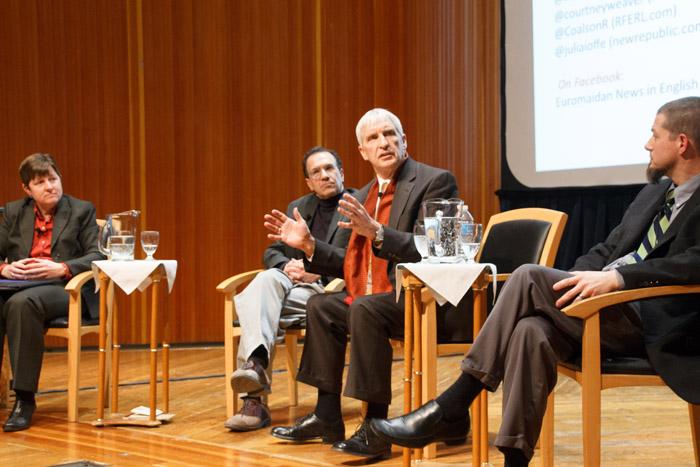Beyond Ukraine or Russia

by Christine Baksi
Nearly 250 people packed the Anita Tuvin Schlechter (ATS) Auditorium on March 6 to learn more about the current situation in Ukraine; what led to tensions between the sovereign state and Russia; and what’s next for the region, the U.S. and the EU. Experts in Russian history, politics and security discussed those issues in an engaging panel discussion sponsored by The Clarke Forum for Contemporary Issues.
The panelists were Craig Nation, visiting professor of security studies at Dickinson and a professor of strategy and director of Eurasian studies at the U.S. Army War College; Karl Qualls, associate professor of history at Dickinson and author of the book, From Ruins to Reconstruction: Urban Identity in Soviet Sevastopol After World War II; and Marybeth Ulrich, professor of government in the Department of National Security at the U.S. Army War College. Professor of Political Science Russell Bova moderated the discussion.
Earlier this year, Ulrich visited the National Defense University in Ukraine at a pivotal time in the protest and shared photos she’d taken of the occupation of Kiev's city center. She circulated among the audience a newspaper and propaganda tourist memento from the revolt.
Qualls began the discussion with “a thousand years of history in 10 minutes,” including a critical history of Crimea and Sevastopol, emphasizing to the audience that the situation is complex. “It’s not binaries. It’s not as easy as just Ukraine or Russia,” he said presenting a brief look at the geopolitical landscape of Ukraine and important similarities between Ukraine and Russia. “The languages are very similar. Age is more of a determinant in whether you want Russia to take Crimea from Ukraine or not.”
Qualls and the panelists answered many questions about Russian President Vladimir Putin. “Taking over Ukraine is not in Putin’s best interest,” said Qualls. “He wants to keep Ukraine weak and compliant. That’s his best interest. Ukraine’s economy is in shambles. Putin doesn’t want to inherit that.”
Nation, who specializes in foreign policy and security affairs of the European and Eurasian regions, said “Demonization of Russia is quite extravagant. We have to think beyond the crisis and bring Russia into a more cooperative relationship,” adding, “Russia is a very difficult nation to envision as a partner (with the west).”
Qualls shared a list of reliable social-media sources for news developments:
Twitter:
@prof4russia (Karl Qualls)
@maxseddon (BuzzFeed.com)
@miriamelder (BuzzFeed.com)
@shaunwalker7 (The Guardian)
@rolandoliphant (The Telegraph)
@kyivpost (Kyivpost.com)
@moscowtimes (themoscowtimes.com)
@CoalsonR (RFERL.com)
@juliaioffe (newrepublic.com)
On Facebook:
WATCH THE ENTIRE PANEL DISCUSSION
Media coverage of the March 6 panel
WITF (NPR affiliate) Professors Qualls and Nation discuss Ukraine and Russia
Published March 10, 2014